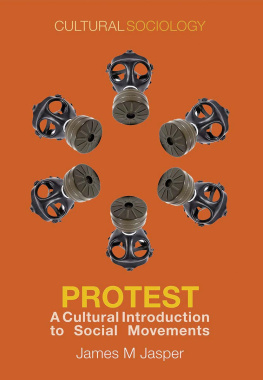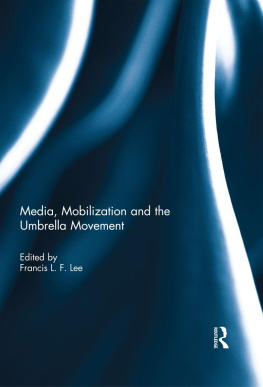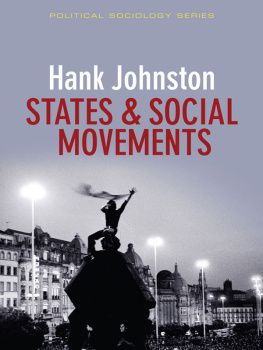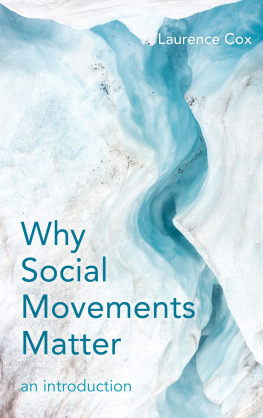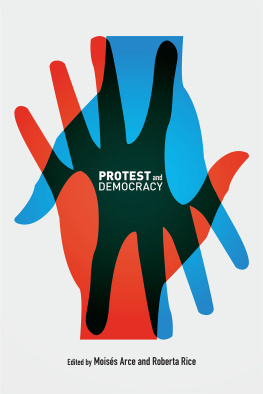Protest
Cultural Sociology series
James M. Jasper, Protest: A Cultural Introduction to Social Movements Frederick F. Wherry, The Culture of Markets
Copyright James M. Jasper 2014
The right of James M. Jasper to be identified as Author of this Work has been asserted in accordance with the UK Copyright, Designs and Patents Act 1988.
First published in 2014 by Polity Press
Polity Press
65 Bridge Street
Cambridge CB2 1UR, UK
Polity Press
350 Main Street
Malden, MA 02148, USA
All rights reserved. Except for the quotation of short passages for the purpose of criticism and review, no part of this publication may be reproduced, stored in a retrieval system, or transmitted, in any form or by any means, electronic, mechanical, photocopying, recording or otherwise, without the prior permission of the publisher.
ISBN-13: 978-0-7456-8670-7
A catalogue record for this book is available from the British Library.
The publisher has used its best endeavours to ensure that the URLs for external websites referred to in this book are correct and active at the time of going to press. However, the publisher has no responsibility for the websites and can make no guarantee that a site will remain live or that the content is or will remain appropriate.
Every effort has been made to trace all copyright holders, but if any have been inadvertently overlooked the publisher will be pleased to include any necessary credits in any subsequent reprint or edition.
For further information on Polity, visit our website: politybooks.com
For Frank Dobbin and Michle Lamont
Contents
Tables and Sidebars
Tables
Sidebars
Preface
The last several years have seen a worldwide outpouring of protest, by citizens in North Africa and the Middle East, Tea Partiers and Wisconsin public employees in the US, the Indignados in Spain, Occupiers around the world, anti-austerity rioters in Europe, Irans green movement, Istanbuls Taksim Square, Kievs revolutionaries, and many others. But we should not forget, as we congratulate ourselves for living through an important moment in world history, that protest occurs every day, around the planet, and it always has. Most of the time we dont even hear about it it is not dramatic or sustained long enough for the media to cover it. Protest is a fundamental part of human existence, and every period in history has the potential to bring about important changes.
Social movements are the form that protest takes most often in todays world. They give regular people an opportunity to explore, articulate, and live out their most basic moral intuitions and principles. Individuals join together to try to recruit, persuade, and inspire others, using all the tools they can find: money, media, stories, collective identities, jokes, cartoons, and sometimes weapons. Some participate casually and sporadically, while others devote their lives to a series of deeply felt causes.
In a cynical world, where we suspect self-interest behind the most seemingly altruistic actions, it might appear hard to understand people who give up material comforts, financial stability, time with family, a normal life, in favor of moral projects and risky tactics that seem to have a vanishingly small chance of success. Who are these people, who often provide such benefits for our society, while taking relatively few for themselves? What motivates them? How do they think about the world? What helps them win or makes them lose?
In recent years scholars who study social movements have come more and more to appreciate the cultural meanings and feelings that accompany protest, and the ways that people weave these together to make sense of their lives and advance their moral dreams. Protestors and those they engage feel their way through actions and decisions, expressing and creating their own goals and identities as well as sifting through a variety of tactics to try to get what they want. We cant understand social movements without understanding participants points of view.
Looking at voluntary collective action for a cause is also a good way to see how culture works, because central to any social movement is the effort to create new meanings. Nowhere is the creation of culture, or its effects on the world we live in, more obvious. We need to appreciate culture to understand protest, but protest also helps us to understand where culture comes from.
Culture is meaning: how we make sense of the world, including how we understand our own actions and motives, how we signal them to others, how we understand the actions of others, and figure out who we are and who we wish to be. It is both in our heads and embodied in physical carriers such as a couple of words painted on a sheet to make a banner to carry in a march. It is both a continuous process and the occasional products of that process.
One aspect of culture consists of the many emotions that give cognitive understandings their power to attract attention or motivate action. Feelings are present in every stage and every aspect of protest, just as they are there in all human life. Once thought to be a source of irrationality, emotions can also aid us in making decisions and pursuing our goals. Indignation, an emotion that combines anger with moral outrage, is the heart of protest, the first signal that we feel there is something wrong in the world that must be fixed. It also gives us the energy to try to fix it.
Strategy is another cultural dimension of protest: decisions about goals and the means to pursue them; the creation of alliances and the identification of opponents; the mobilization of resources to enable the tactics we select. Strategic choices are rarely straightforward; there are innumerable puzzles and dilemmas that protestors must negotiate. For every choice, there are costs and dangers alongside the promises and benefits. As we proceed, I will identify some of the most common of these tradeoffs, because to understand how protestors do what they do (and whether they win or lose), we need to watch them struggle with these dilemmas. (Tradeoffs become dilemmas when decision-makers recognize and grapple with them.) We cant understand how they make strategic decisions except through the cultural meanings that they have available or which they invent. Even the most pedestrian choices are filtered through a cultural lens.
I will use three labels, social movement, protest movement, and protest, almost interchangeably. Most social movements are protest movements, focused on what participants find offensive in their world, even though they may also go on to develop positive proposals for alternatives. (Some do and some do not develop ways of doing things differently.) British citizens battling to stop new roads are a protest movement; those promoting craft ales over mass-produced lagers are a social movement. So protest movements are a subset of social movements.

